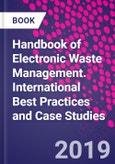Handbook of Electronic Waste Management: International Best Practices and Case Studies begin with a brief summary of the environmental challenges associated with the approaches used in international e-waste handling. The book's authors offer a detailed presentation of e-waste handling methods that also includes examples to further demonstrate how they work in the real world. This is followed by data that reveals the geographies of e-waste flows at global, national and subnational levels. Users will find this resource to be a detailed presentation of e-waste estimation methods that also addresses both the handling of e-waste and their hazardous effect on the surrounding environment.
Please Note: This is an On Demand product, delivery may take up to 11 working days after payment has been received.
Table of Contents
Part 1 Thematic
1 An overview of treatment technologies of e-wastes
Peeranart Kiddee, Jatindra Kumar Pradhan, Sanchita Mandal, Jayanta Kumar Biswas and Binoy Sarkar
2 Urban mining of e-waste: treasure hunting for precious nanometals
Sammani Ramanayaka, S. Keerthanan and Meththika Vithanage
3 Biochemical hazards associated with unsafe disposal of electrical and electronic items
Kalyani Korla and Chanchal K. Mitra
4 Policy issues for efficient management of e-waste in developing countries
Rajiv Ranjan Srivastava and Pankaj Pathak
5 E-waste as a challenge for public and ecosystem health
Lakshika Weerasundara, Kushani Mahatantila and Meththika Vithanage
6 Electrochemical enhanced metal extraction from e-waste
Ahamed Ashiq, Asitha Cooray, Srikanth Chakravartula Srivatsa and Meththika Vithanage
7 Phytoremediation for e-waste contaminated sites
Viraj Gunarathne, Sameera R. Gunatilake, Sachithra T. Wanasinghe, Thilakshani Atugoda, Prabuddhi Wijekoon, Jayanta Kumar Biswas and Meththika Vithanage
8 Organic pollutants from e-waste and their electrokinetic remediation
Don Liyanage and Janitha Walpita
9 Mapping the emergence of research activities on "e-waste�: a scientometric analysis and an in-depth review
Anwesha Borthakur and Pardeep Singh
Part 2 Case studies
10 Waste electrical and electronic equipment in India: diversity, flows, and resource recovery approaches
M.N.V. Prasad
11 Socio-technological challenges in formalization of e-waste recycling in India
Pooja Pandey
12 Electrical and electronic waste in Pakistan: the management practices and perspectives
Sadia Ilyas, Rajiv R. Srivastava and Zaigham Abbas
13 Challenges in e-waste management in Sri Lanka
Wilka Wayanthi Ranasinghe and Bandunee C.L. Athapattu
14 Electronic waste management practices in Nigeria
I.C. Nnorom and O.A. Odeyingbo
15 e-Waste recycling slum in the heart of Accra, Ghana: the dirty secrets
Martin Oteng-Ababio
16 E-waste situation and current practices in Brazil
Ricardo Gabbay Souza
17 The impact of waste of electrical and electronic equipment public police in Latin America: analysis of the physical, economical, and information flow
Luz Ange�lica Rodri�guez-Bello and Enrique Estupin~a�n-Escalante
18 Environmental pollution of e-waste: generation, collection, legislation, and recycling practices in Mexico
Claudia Estela Saldan~a Dura�n, Gerardo Bernache Pe�rez, Sara Ojeda-Benitez and Samantha E. Cruz-Sotelo
19 Improving sustainability of e-waste management through the systemic design of solutions: the cases of Colombia and Ecuador
S. Me�ndez-Fajardo, H. Bo�ni, P. Vanegas and D Sucozhanay
20 e-Waste management in Ecuador, current situation and perspectives
Paul Vanegas, Andre�s Marti�nez-Moscoso, Dolores Sucozhanay, Pablo Pano, Andre�s Tello, Adriana Abril, Ismael Izquierdo, Gustavo Pacheco and Marc Craps
21 The Chilean regulation of waste electrical and electronic equipment (WEEE): some of the challenges and opportunities to incorporate informal e-waste recyclers
Uca Silva and Gloria Baigorrotegui
22 Electronic waste management in Romania: pathways for sustainable practices
Florin-Constantin Mihai
23 e-Waste management practices in Australia
Md Tasbirul Islam and Nazmul Huda
24 E-waste policies in the United States: minimalistic federal action and fragmented subnational activities
Katja Biedenkopf








